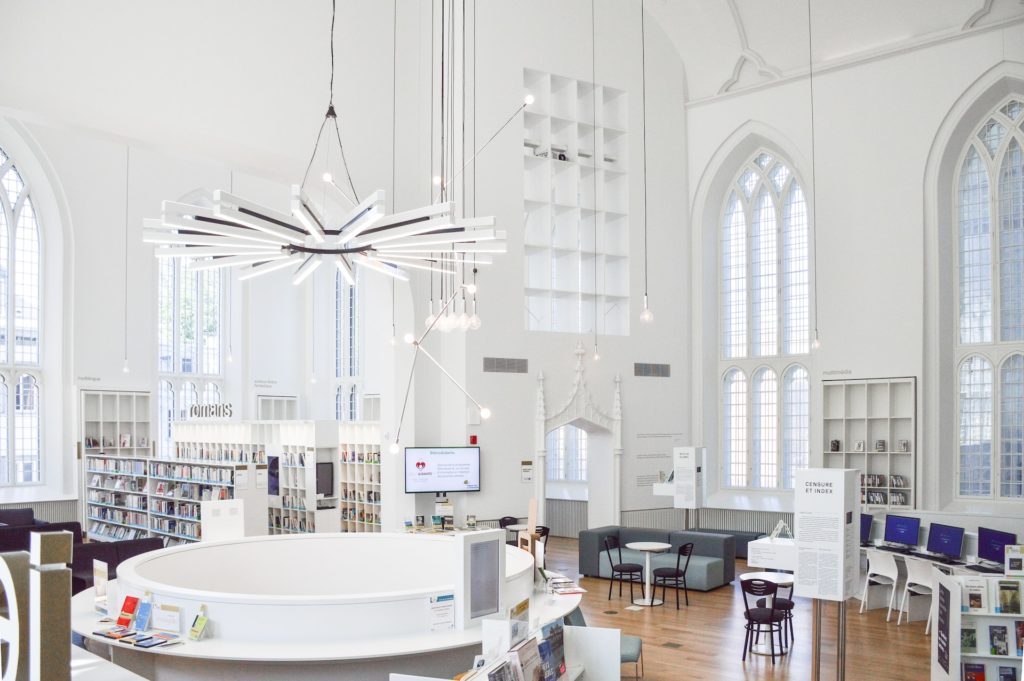Trends come and go. In our current moment, social justice ideology—commonly known as being woke—is the leading trend, at least in the educational world in which I work. Woke thought includes the ideas that racism is not only systemic but perpetual, and can only be fought with more discrimination.1 It teaches that rather than having sexed bodies, we have gender identities, and the only acceptable option is to affirm a child’s subjective experience that their gender identity does not align with the gender they were, as the woke put it, “assigned at birth.” Whether you agree or disagree with these statements, they are probably enough to let you know what I’m talking about when I refer to “woke thought.”
This woke thought influences our politics and culture to an alarming degree, as many have written already. What I want to explore here is this: How does woke culture affect those people this magazine has dubbed abstract intense?
When Questioning Is Violence
The problem with woke thought isn’t its ideas. It’s its emphasis on ideological conformity. To the woke, questions are a sign of “privilege”—and perhaps even “supremacy.” Under this worldview, questions are “violence.”
How does this affect the abstract intense?
The life of the mind is the abstract intense person’s modus operandi. They think more deeply about ideas than the general population, driven by their nature to ponder philosophical and scientific questions. This tendency can, even at the best of times, lead to tension and isolation, and these idea-driven people sometimes struggle to find like-minded people who will engage their excitable intellects.

For this crowd, woke culture’s demands for ideological conformity make it even harder for them to find a place they fit. The average person just remains silent and nods along during the latest DEI (diversity, equity, and inclusion) workshop. More cynically, it’s advantageous to their careers to nod along; more charitably, though, wokeness appears valiant on its surface. After all, it is supposed to be about defending the marginalized against discrimination.
But the abstract intense person craves depth of understanding. As a deep thinker, he will seek clarification and test ideas. Do the teachings of social justice really achieve what they promise? Until he has satisfied himself that they do, he won’t necessarily abide by received wisdom.
The abstract intense person will seek clarification and test ideas. Do the teachings of social justice really achieve what they promise? Until he has satisfied himself that they do, he won’t necessarily abide by received wisdom.
The Socratic Ideal
That has been my experience. I am an abstract intense public school teacher, and I have found troubling contradictions in woke thought that leave me feeling uncomfortable not just at my very woke workplace, but even among some of my acquaintances and family members. I care deeply about all human beings and am highly aware of how poorly ethnic and gender-nonconforming minorities have been treated throughout history. However, I do not see how the woke approach, which includes race and gender essentialism, is the right solution to these societal woes.
So what would work? Abstract intense people have a lot to offer as we seek solutions. The problem is that this is not a tolerant moment for those who think differently.
In both my personal relationships, and in my role as educator, I’ve found inspiration in the Socratic method and humbly attempted to practice it. This is a pedagogical approach that centers questioning. It’s been a deeply rewarding pedagogical tool, perfectly aligned to my probing personality—and that of my most intellectually curious students.

When that Socratic dynamic is flowing, it’s electric. It demands intellectual integrity of the questioner and questioned alike. For this process to work, there can be no verboten arguments. Even if a talking point is unpopular—even if it is perceived by some as dangerous, we have to keep asking why, with the ultimate goal of arriving closer to the truth. When executed well, it’s a humbling process, since the truth is elusive. You may realize you were not as insightful as you previously thought. Yet it’s also an exhilarating conduit for the kind of genuine a-ha! moments that are among the abstract intense types’ contributions to society—and that make their lives feel meaningful.
What’s Going On In Schools
It’s been a long time since I’ve felt that kind of intellectual charge in my classroom. It’s not because I’m not trying, although I’ll admit I’ve grown more tentative, since, frankly, the students, parents, and school administration frighten me.
I’ve been admonished by my administration and students alike for teaching books that “are too white” and for including too many primary sources written by people of European ancestry. So I asked myself, do they have a point? This could make a great Socratic discussion, both inside and outside of the classroom.
So I asked myself, do they have a point? This could make a great Socratic discussion, both inside and outside of the classroom. But that’s precisely the kind of conversation that is awfully risky to have in this climate.
But that’s precisely the kind of conversation that is awfully risky to have in this climate. Following the Socratic method, we must ask whether it might be legitimate to include a large number of primary sources written by white people, since they are the foundation on which this culture has been built. And we also must ask whether I should include more Indigenous content; and then, since Indigenous peoples had an oral culture and not a written one, which historical documents of native origin we should consider.
I’ve brought this up, and was quickly told that this is a “Eurocentric” view. Maybe my interlocutor was right. But he wasn’t open to further discussion, so I just don’t know.
This extends to other topics as well. Teachers in my district are frequently pushed to explore gender ideology in the classroom. This is another area where I feel very uncomfortable, since I’m acutely aware that young people have been transitioning at striking rates, and I worry that classroom indoctrination is playing a major role.
The Emotional Cost of Forbidding Questioning
Like many abstract intense people, I am highly emotionally excitable. I’m often nervous that another admonishment from my principal, or a parent, is just around the corner, especially since a few of my teacher colleagues have faced disciplinary action for similar challenges to woke ideology either in front of students, or during staff and union meetings.
In other words, this is a pretty hostile work environment. It’s certainly no place for an abstract intense person to flourish.
And that is a big change. Educational institutions have traditionally nurtured the intellectual gifts that come with abstract intensity. I am a teacher. Isn’t it my job to challenge the students to back up their points when they assert that “J. K. Rowling is a transphobe” or that my country is “genocidal?” Shouldn’t I encourage my students to question whether all young people who experience gender dysphoria need to medically transition? (After all, I’m aware of a few trans-identifying students in my building who might be considering this.) Shouldn’t we clarify what white supremacy really looks like? (Though I’m open to where the Socratic method would lead, I suspect it would not look like Canada.)
What exactly is the right thing to do?
What Do Our Values Demand?
I’ve had anxiety attacks as I grapple with this question, since I don’t feel emotionally strong enough to handle the kinds of public shaming that cancellation entails—not to mention the potential loss of income. Every time I make a comment in line with my ideals for education, I panic. I check my email and walk quickly past my administration’s offices, hoping there won’t be yet another uncomfortable talk about my classroom behaviour, since kids at my school are quick to inform on woke non-conforming teaching staff, as I’ve already learned the hard way.
I’m grateful I still have a job. That said, I often feel inadequate, since I cannot share my intellectually curious nature with my students. Since I’ve been told that I’m not doing nearly enough for gender and racial equity in the classroom, I’ve been holding back even more, which makes me feel like a moral coward. Ethically, am I not obligated to go further, even if it leads to job loss, since these young people could end up irreparably harmed? What about the intellectual costs for these young people, who have been taught that their country is full of morally depraved bigots and never once questioned whether this dark tale is actually true?
Since I’ve been told that I’m not doing nearly enough for gender and racial equity in the classroom, I’ve been holding back even more, which makes me feel like a moral coward.

I know I’m far from always right. Mostly what I have are questions, not answers. The trouble is, the woke have little to no tolerance for doubt. I’ve been told by my union, in no uncertain terms, that I’m duty-bound to abide by my government’s Equity Action Plan, which applies the twin doctrines of so-called “anti-racism” and gender ideology, or face potential firing.
The fact that I have seen so little questioning of these ideas in general leads me to suspect that the architects of that Equity Plan may not have thought very deeply about how it will impact students. The authors were undoubtedly sophisticated, educated people, but there’s something oddly hollow about their conclusions. They insist that we can only have a fairer society when we embrace ideology rather than grapple with complexity. I doubt they have considered the research about how ineffective DEI training is, or that the majority of youth who suffer from gender dysphoria grow out of it or have undiagnosed comorbidities such as autism or post-traumatic stress disorder (PTSD).
It’s worth noting that not all abstract intense people will agree with my views. Certainly, some of my students who assert these things are themselves abstract intense—or, as they have been called, “intellectually gifted.” But those people more than anyone need to learn to train their intellects, to ensure they are pursuing real justice and real truth. None of us can figure this out on our own. We need others who are able to challenge us. I welcome their challenges, to my ideas if not to my livelihood. Do they welcome mine?
We urgently need a Socratic, abstract-intense approach, both in our schools and in the public sphere. The woke claim to be inclusive, but they fail to understand that for some people, mouthing agreement with their precepts to evade trouble feels undignified, even treasonous.
Surely, we need some abstract intense energy, right now.
Footnote
- For instance, in his book How to be an Anti-Racist, author Ibram X. Kendi writes, “The only remedy to racist discrimination is antiracist discrimination. The only remedy to past discrimination is present discrimination. The only remedy to present discrimination is future discrimination.”
Biography photo courtesy Element5 Digital via Unsplash.
Header image courtesy




